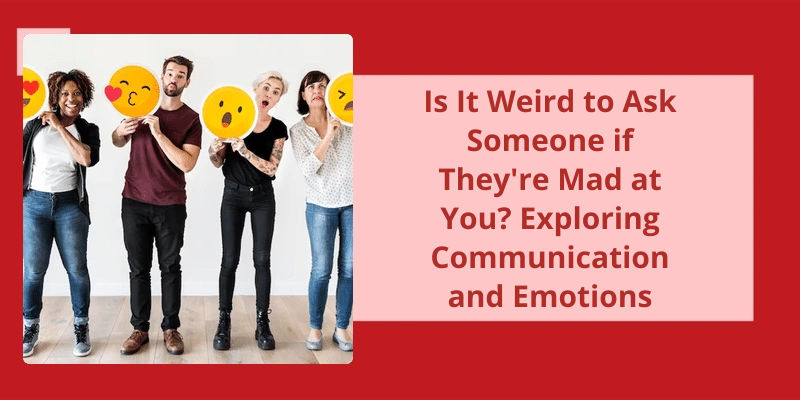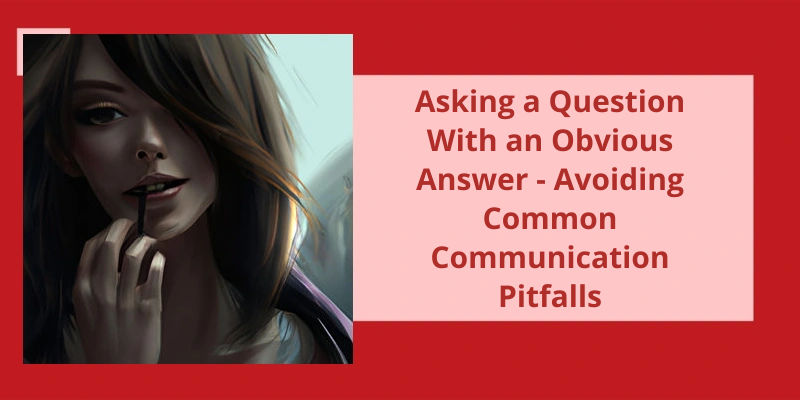Navigating the intricacies of social interactions and emotions can often be a delicate and challenging task. Among the myriad of uncertainties that arise in our daily interactions with others, one common dilemma is the question of whether it’s strange or uncomfortable to ask someone if they’re mad at us. This perplexing conundrum reflects our innate desire for clarity and understanding, seeking to bridge the gap between assumptions and reality. However, the act of inquiring about someone's emotional state can be riddled with uncertainties, fears of confrontation, and potential misunderstandings. While it may not always be easy or pleasant, broaching the subject is sometimes necessary to address the underlying tensions and foster open communication. It’s crucial to approach this delicate conversation with empathy, recognizing that people's emotions are complex and multifaceted, and may not always be a direct result of one's actions. By staying attuned to the nuances of human emotions and proactively engaging in empathetic communication, we can navigate the delicate terrain of interpersonal relationships and cultivate deeper connections with those around us.
Is It Bad to Ask a Girl if They Are Mad at You?
Is it weird to ask someone if theyre mad at you? Exploring communication and emotions can often unveil the complexity and nuances of human relationships. When it comes to asking a girl if she’s mad at you, it’s important to approach the situation with caution. While communication is crucial for understanding each others emotions, the manner in which the question is asked and the context surrounding it can greatly impact the outcome.
Asking someone if they’re mad at you may sometimes be perceived as a sign of insecurity or overthinking. In some cases, this can make the other person feel pressured or uncomfortable. It’s essential to remember that emotions are multifaceted, and sometimes someones mood may not be related to you at all. Jumping to conclusions or assuming the worst can create unnecessary tension in the relationship.
Instead of directly asking if she’s mad at you, it can be more effective to create an open and supportive space for her to express her feelings. Actively listening, showing empathy, and engaging in meaningful conversations can help foster trust and understanding. By promoting open communication channels, you allow her to share her emotions willingly, leading to a healthier and stronger connection.
Furthermore, it’s crucial to be mindful of timing and choose the right moment to address any potential issues. Broaching the subject when both parties are calm and receptive can enhance the chances of a constructive conversation. It’s also important to pay attention to non-verbal cues and changes in behavior, as they can provide valuable insight into someones emotional state.
In summary, asking someone directly if they’re mad at you may not always be the best approach. Instead, promoting open communication, creating a safe space for expression, and being attentive to the other persons emotions can help navigate challenging situations. Understanding that emotions are complex and not always tied to a specific incident will enable both parties to foster stronger relationships built on trust and understanding.
The Benefits of Seeking Professional Help or Guidance in Navigating Difficult Emotions and Communication Issues Within a Relationship.
- Access to Expertise: Seeking professional help allows individuals to access the expertise of trained professionals who specialize in relationship dynamics and emotional well-being. These professionals have the knowledge and skills to help individuals navigate through difficult emotions and communication issues, providing insights and guidance that can improve the overall quality of the relationship.
- Objective Perspective: Professional therapists or counselors provide an objective perspective on the relationship dynamics. They can help individuals identify patterns, underlying issues, and biases that may be contributing to difficulties in communication and emotional expression. This objective viewpoint can facilitate healthier communication and enable individuals to gain a better understanding of themselves and their partner.
- Improved Communication Skills: Professionals can teach individuals effective communication strategies and techniques. By learning better ways to express emotions and thoughts, couples can enhance their ability to understand each other, resolve conflicts, and deepen their emotional connection. Improved communication skills also extend beyond the relationship, benefiting other areas of life.
- Emotional Support: Professional help offers a safe and supportive environment for individuals to express and process their emotions. Trained therapists can help individuals deal with difficult feelings, such as anger, resentment, or sadness, and guide them towards healthier emotional expressions. This emotional support can lead to increased self-awareness, emotional growth, and overall well-being.
- Conflict Resolution: Professionals can assist individuals in navigating conflicts within the relationship. They can provide strategies to de-escalate conflicts, facilitate productive discussions, and identify mutually beneficial solutions. Learning effective conflict resolution skills can lead to a more harmonious and satisfying relationship.
- Identifying and Addressing Unhealthy Patterns: Trained professionals can help individuals identify unhealthy relationship patterns and dynamics that may be contributing to difficulties. By recognizing these patterns, individuals can work towards breaking negative cycles and creating healthier relationship dynamics.
- Validation and Empathy: Seeking professional help allows individuals to receive validation and empathy from someone outside the relationship. This validation can help individuals feel heard and understood, enhancing their emotional well-being and fostering a sense of connection and support.
- Strengthened Relationship Bonds: Through professional help, individuals can develop a deeper understanding of themselves and their partners. This increased self-awareness and understanding can improve emotional intimacy, trust, and strengthen the overall bond between partners.
- Personal Growth: Seeking professional help within a relationship can lead to personal growth for both individuals. It provides an opportunity for self-reflection, learning, and development of new coping mechanisms and problem-solving skills that can be applied not only in the relationship but also in other aspects of life.
It’s important to navigate social interactions with tact and sensitivity, especially when addressing potential conflicts. Rather than bluntly asking someone if they’re mad at you, it’s often more effective to adopt a softer approach. By posing the question, “How are you feeling?” you create an opportunity for open dialogue and may uncover the underlying reasons behind their unusual behavior.
Is It Rude to Ask Someone if They’re Mad at You?
Is it rude to ask someone if theyre mad at you? This is a question that many individuals struggle with when faced with an uncomfortable or strained relationship. While direct communication is often favored in resolving conflicts, asking someone directly if theyre angry with you can come across as confrontational or accusatory, adding fuel to the fire. Instead, it may be more effective to take a different and softer approach.
One approach to consider is starting the conversation with a more general question: “How are you feeling?”. This allows the person to potentially open up about their emotions without feeling attacked or put on the spot. By asking this question, you show genuine concern for their well-being, creating a space for them to express any negative emotions they may be experiencing.
Another way to approach the situation is to express your own vulnerability. By sharing your own feelings and concerns, you create an opportunity for the other person to reciprocate and share their own emotions. For example, you could say, “Ive noticed that things have been a bit tense between us lately, and I wanted to check in to see how youre doing. Is there something on your mind?”
Using non-judgmental language is also important when addressing this topic. Instead of assuming someones emotions or making negative assumptions, focus on your own observations and seek clarification. For instance, you could say, “Ive noticed that you seem a little distant lately. Is everything alright?”. This approach allows room for open communication without making the other person defensive or guarded.
Furthermore, it’s important to create a safe and supportive environment for the person to express their emotions without fear of judgment or consequence. Assure them that you genuinely care about their well-being and that your intention is to understand and find a resolution. Active listening and empathy are key components in fostering such an environment, as they demonstrate your willingness to understand their perspective and validate their emotions.
Asking a more general question about their emotions, expressing your own vulnerability, using non-judgmental language, and creating a safe environment are all key elements in fostering effective communication and understanding. By taking these approaches, you can encourage honest and productive conversations, leading to a healthier and stronger relationship.
Managing Emotions: Provide Tips on How to Handle Your Own Emotions When Asking Someone if They’re Mad at You. Exploring Strategies Such as Self-Regulation, Deep Breathing, and Mindfulness Can Help Individuals Approach the Conversation With a Calm and Collected Mindset.
- Take a deep breath before initiating the conversation.
- Practice self-regulation techniques to manage your own emotions.
- Remind yourself to approach the conversation with a calm and collected mindset.
- Use mindfulness techniques to stay present and focused during the conversation.
- Avoid making assumptions about the other person’s emotions.
- Listen actively and empathetically to their response.
- Be open to feedback and willing to address any concerns they may have.
- Consider seeking professional guidance or therapy if your emotions become overwhelming.
- Remember that effective communication involves both expressing yourself and listening to the other person’s perspective.
Source: How to Ask Someone if They Are Upset With You
However, detecting someone’s anger isn’t always as straightforward as these obvious signs. There are more subtle cues that can indicate someone is mad at you without them explicitly expressing it. These non-verbal and behavioral indicators require keen observation and understanding of human emotions. By paying attention to these nuanced signals, you can gain insights into someone’s feelings towards you, even if they choose not to openly communicate their anger.
How Do You Tell if Someone Is Mad at You Without Asking?
Communication and understanding emotions can sometimes be a tricky aspect of human interaction. One common concern is how to tell if someone is mad at you without explicitly asking them. While it may not always be possible to accurately gauge someones emotions without direct communication, there are a few subtle cues that can offer insight.
Non-verbal cues can often reveal a persons emotional state. For instance, if their face appears flushed or tense, it could indicate anger or frustration. Additionally, aggressive body language such as abruptly moving away from you or towards you could suggest irritation. It’s essential to pay attention to these signals, as they can offer valuable insights into someones emotions.
Another indicator that someone might be mad at you is through their verbal communication. If they reply to your questions or statements with short, quick answers, it could be a sign that they aren’t in the mood to engage in conversation. Their tone of voice might also become rude or more assertive, indicating their frustration. It’s crucial to be attentive to these verbal cues, as they can illuminate underlying emotions.
Furthermore, a sudden change in behavior or demeanor can also signify that someone is upset. If they seem distant, avoid eye contact, or display a general lack of interest, it could indicate that they’re harboring negative emotions towards you. It’s essential to be sensitive to these changes and approach the situation with empathy and understanding.
Moreover, if someone appears to be in a hurry and doesn’t have the time or willingness to engage in a conversation, it might suggest that something is bothering them. This behavior can signify that they aren’t in the mood to talk or interact, potentially indicating that they’re upset with you.
Despite these cues, it’s crucial to remember that interpreting someones emotions accurately can be challenging. It’s always best to approach the situation with open communication, empathy, and a willingness to address any issues directly. By talking openly about your concerns and asking if something is wrong, you can foster a healthier and more productive dialogue to resolve any potential conflicts.
Instead of directly addressing the issue at hand, some individuals resort to asking if someone is mad at them as a way to alleviate their own discomfort. While they may genuinely feel remorse or a desire for resolution, this question often serves as a means to shift the focus away from their actions and assuage their guilt. It’s essential to delve deeper into this behavior and understand it’s underlying motivations to establish effective communication and resolution.
Why Would a Guy Ask if You Are Mad at Him?
If a guy asks if you’re mad at him, it may indicate that they’re feeling uncomfortable with the presence of anger in the interaction. They may feel guilty for something they did or said, and asking this question can serve as an attempt to alleviate that guilt. By understanding whether or not you’re angry, they can gauge the severity of their actions and potentially reassure themselves that they haven’t caused too much harm.
In some cases, this question may also stem from genuine remorse. The person might genuinely regret their behavior and want to apologize or make amends. By confirming whether you’re mad or not, they can take appropriate steps to rectify the situation and address any hurt they may have caused. This displays a level of emotional intelligence and a willingness to take responsibility for their actions.
However, it’s essential to recognize that the subconscious objective behind asking if someone is mad at them is to make themselves feel more comfortable, rather than solely focusing on the emotions of the person they wronged. By seeking reassurance and gaining insights into your emotional state, they can relieve their own discomfort and possibly lower their guilt levels.
Strategies for Effectively Expressing Anger and Resolving Conflicts.
When it comes to expressing anger and resolving conflicts, there are several strategies that can be useful. Firstly, it’s important to approach the conversation calmly and respectfully. Name-calling or blaming the other person will only escalate the situation. Instead, use “I” statements to express your feelings and concerns. This approach allows you to take ownership of your emotions without attacking the other person.
Active listening is also crucial in conflict resolution. Give the other person the opportunity to share their perspective without interruption, and genuinely try to understand their point of view. Reflect on what they say and paraphrase it back to them, so they feel heard and validated.
Seeking a compromise or finding a middle ground can often be helpful. Look for solutions that can meet both parties’ needs. It’s important to focus on finding a resolution rather than “winning” the argument.
Lastly, taking a break if emotions are running high can be beneficial. Sometimes, stepping away from the situation can provide clarity and prevent further escalation. Breathing exercises or engaging in a calming activity can help reduce anger and stress levels before returning to the conversation.
Instead of dismissing their concerns or minimizing the situation, it’s essential to acknowledge and validate their emotions. Making light of the problem will only exacerbate their anger and hinder any potential resolution. Openly empathizing with the individual’s frustrations can pave the way for effective communication and understanding.
What to Do When Someone Is Secretly Mad at You?
When someone is secretly mad at you, it can be a challenging situation to navigate. The first step is to empathize with the other person and acknowledge their emotions. Expressing understanding and validation can help defuse anger and create a safe space for communication. Simply saying something like “That sounds very frustrating” or “I can see why that would be upsetting” shows that you’re willing to listen and understand.
It’s important to remember that the person may be struggling to communicate their feelings effectively. They might be holding back on expressing their anger directly, so it’s crucial to mentally remind yourself that they’re upset and doing their best to convey their emotions. By being patient and compassionate, you can make it easier for them to open up and address the issue.
Avoid making light of the problem or dismissing their feelings. Minimizing the situation can make the other person feel unheard or invalidated, exacerbating their anger. Instead, take their concerns seriously and demonstrate a genuine willingness to find a resolution. This can help rebuild trust and strengthen the bond between both parties.
Furthermore, be open to having a conversation about the issue. Encourage the person to express their thoughts and concerns openly and honestly. Actively listening and showing genuine interest in understanding their perspective can help diffuse tension and facilitate effective communication. Remember, it’s crucial to be patient and maintain a calm demeanor during this conversation, as getting defensive or confrontational may escalate the situation.
Lastly, try to find a resolution together. Explore potential solutions and collaborate on finding common ground. By approaching the situation with a problem-solving mindset rather than a defensive one, you can work towards resolving the issue and maintaining a healthy relationship. Remember, effective communication and understanding are the keys to navigating and resolving conflicts.
Recognizing Signs of Secret Anger in Others Discussing the Subtle Cues and Behaviors That Indicate Someone May Be Secretly Mad at You, Such as Passive-Aggressive Behavior, Avoidance, or Sarcasm.
It isn’t uncommon to feel the need to ask someone if they’re mad at you when you sense something is off in your communication. However, there are often subtle signs that can indicate someone’s secret anger towards you. One such sign is passive-aggressive behavior, where the person may exhibit indirect aggression instead of openly expressing their frustration. They may also display avoidance, avoiding conversations or interactions with you. Sarcasm can also be a cue, as it can be used as a veiled way of expressing anger. Recognizing and addressing these cues can help open up a dialogue and resolve any hidden tensions.
Conclusion
In conclusion, addressing the question of whether it’s weird to ask someone if they're mad at you involves navigating a complex web of communication and emotions. While there may be instances where it’s uncomfortable or difficult to approach the subject, it’s important to recognize when such conversations are necessary for the sake of understanding and maintaining healthy relationships. However, it’s equally crucial to acknowledge that not every expression of anger or frustration is directed towards us, as individuals, and that sometimes people's emotions are influenced by factors beyond our control. Ultimately, finding the balance between addressing concerns and respecting boundaries is key in cultivating open and honest communication.






